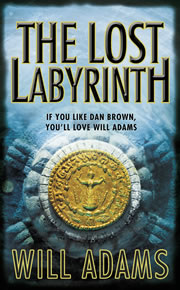
The Lost Labyrinth
The Lost Labyrinth of the title refers in part to the legendary labyrinth of King Minos at Knossos on the island of Crete, where much of the novel is based; but it’s also intended to conjure up the labyrinthine history of the Minoan empire itself, which seems to grow in complexity the more we learn about it. Were the Minoans a culture unto themselves, for example, or did they owe more to Africa and Asia than is commonly believed? Was their empire destroyed by the Thera eruption? Were they the basis of the Atlantis legend? And what happened to them and their ideas after they fell?
I’d been brooding on these questions for a while when I spent an afternoon in a library in Alexandria (no, not that one). While scouring the various archaeological box-files, I came across an article on the district of Eleusis in Alexandria, established by Alexander the Great and the Ptolemies as the centre for the practice of the Eleusinian Mysteries in Egypt.
I’d always been intrigued by these Mysteries. Practised at the port of Eleusis, just outside Athens, for nearly two thousand years, they’d only finally been supplanted by Christianity in the early centuries AD. Sophocles had considered thrice happy anyone initiated into the rites. Cicero had called them Athens’ greatest gift to man. Plato had praised them as the perfect intellectual pleasure. These were brilliant and sophisticated people, unlikely to be taken in by crude theatrics or suspect philosophy. But because the Mysteries had been protected by such strict secrecy (people were put to death for merely hinting at their true nature), no one knew precisely what had taken place within the sanctuary's high walls, leaving them as a tantalising historical mystery – perfect material for a plotline.
The Mysteries hadn’t only been practised at Eleusis, but all around the Aegean. Intriguingly, the sanctuaries had started appearing at roughly the same time the Minoan empire had fallen, and the rites (as best we can tell) incorporated a great deal of Minoan theology. It seemed plausible that the Mysteries were in some way a relic of the Minoan empire. And the fact that they’d eventually been practised in Alexandria gave me a way to put my Egyptologist hero Daniel Knox at the heart of the story. Books like mine are essentially treasure hunts, however, and so by definition need a great lost treasure to be searched for. As far as I knew, Eleusis had none to offer. But then I learned something startling. Anyone could be initiated at Eleusis, even slaves, just so long as they could speak Greek, and could afford the fee. Anyone, that is, except people with ‘blood on their hands’ – murderers. Yet even murderers could be purified of their guilt, as Hercules himself famously was. And the ceremony for purification involved perhaps the greatest lost treasure in Greek legend: The Golden Fleece.
Links
The British School at Athens at Knossos